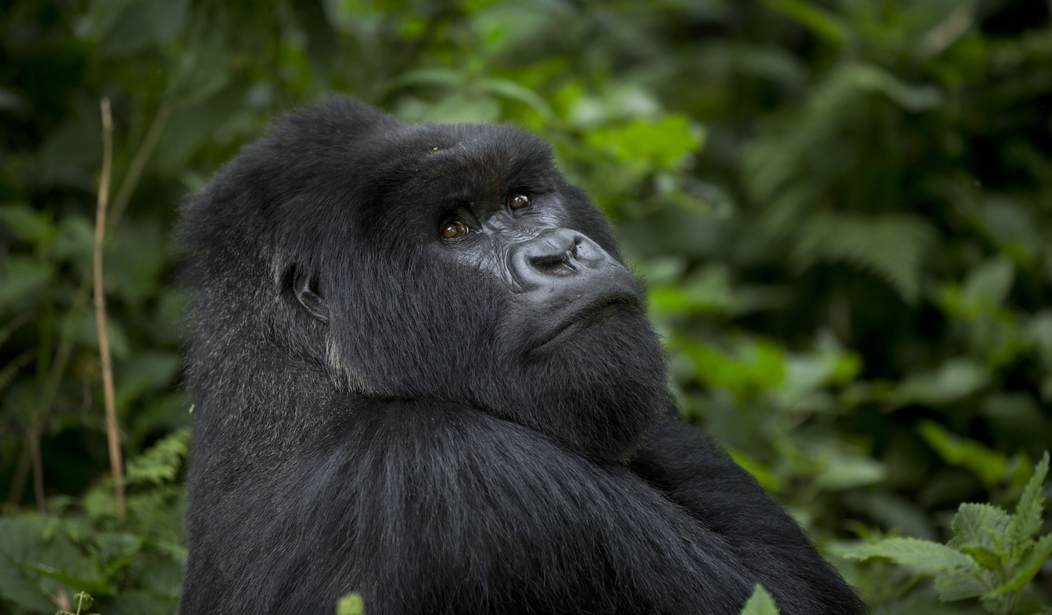Apes are interesting animals. There is an uncanny valley effect if you're interacting with an ape; there is something about them that is more than just an animal, like a dog or cat, but at the same time, not quite human. I've had the opportunity to do this a couple of times, and if you ever get the chance to do the same, I recommend it; it's a thought-provoking experience.
The first time was in the Honolulu Zoo where I sat, a foot or so away from a big male chimp (with an inch or so of plexiglass between; chimps are aggressive and can be really dangerous) and we made eye contact; there was more going on behind those eyes than with your usual run of domestic critters, but as I say, not quite like a person.
Second, some years back we had a friend who raised and trained orangutans, both for his Las Vegas show and for movies (yes, including that movie) and my wife and I both had the opportunity to interact with his apes, who were rather timid but friendly. We once spent an afternoon in our friend's living room with Katie, a 10-year-old female. For the whole two hours, we sat there, Katie had one long, long arm around my wife, gently holding my wife's hand.
It's a neat experience. These are animals that just miss humanity by a smidge, and it's neat being around them.
Now we see that in Africa, the great apes are endangered by climate change; it's not like you might think, these apes are endangered by the mining of raw materials for electric vehicle batteries, which is destroying their habitat.
Mining companies hunting critical minerals could wipe out more than a third of Africa’s remaining great apes, a new study has found.
And by putting new human settlements in close proximity to the declining refugia of wild species, such a boom also risks fostering future pandemics.
The research published on Wednesday in Science Advances highlights the need for the revolution in clean energy to be accompanied by stringent protection for biodiversity.
Here's the thing: It seems we are going to have a hard time keeping both of those balls in the air.
Mining booms — whether for coal or cobalt — tend to be staggeringly destructive processes: A feedback loop of new roads pushed into the forest, which draw in job-seeking colonists, who further clear habitat.
This dynamic is particularly stark in Africa, where some of the world’s largest reserves of nickel, cobalt, copper and lithium lie beneath the soil — and nearly half a million great apes live in the forests above.
About 20 percent of projects seeking funding from the World Bank overlap with ape habitat, according to the study.
Bear in mind it's not just the mining that is intruding into ape habitat. The mines require workers, and those workers moving into a new area will bring their families. This involved breaking up forests for homes and farming plots, increasing the destruction of habitat.
Africa, of course, being made up mostly of countries struggling to modernize in the face of interference from the developed world, has different priorities than most of the West. In Africa — and I've worked in Africa, albeit briefly, and my impressions align with this — people are far more concerned with jobs than apes, and if they can work extracting raw materials for EV batteries so Americans and Europeans can feel smug about their carbon footprints, then they'll happily grab at the chance.
See Related: MUST WATCH: Guyana President Lights Up BBC Host Who Tries to Climate Shame Him Over Extracting Oil
And well they should; there's little or no reason anyone should expect the government of any nation should put the interests of other nations ahead of their own, unless, of course, you're talking about Democrats in the United States.
This situation is a textbook example of the Law of Unintended Consequences. Developed-world liberals, worried about the ever-more ephemeral "anthropogenic climate change," want electric vehicles, because internal combustion engines are bad. The electric vehicles require batteries — big, heavy, expensive batteries. Manufacturing those batteries requires raw materials — copper, cobalt, and lithium. Some of the world's largest deposits of these raw materials are in Africa. African people live in some of the poorest countries in the world, and if there are mining jobs available, they'll jump at them and worry about the habitat later.
Africa, as we've noted, is where all but one of the various kinds of great apes live, including chimps, bonobos, and gorillas. That mining is destroying their habitat, and furthering the decline of some of nature's most intelligent and interesting beings.
So, when you buy an electric vehicle, you're helping wipe out great apes. Think about that, John Kerry!
This seems appropriate.













